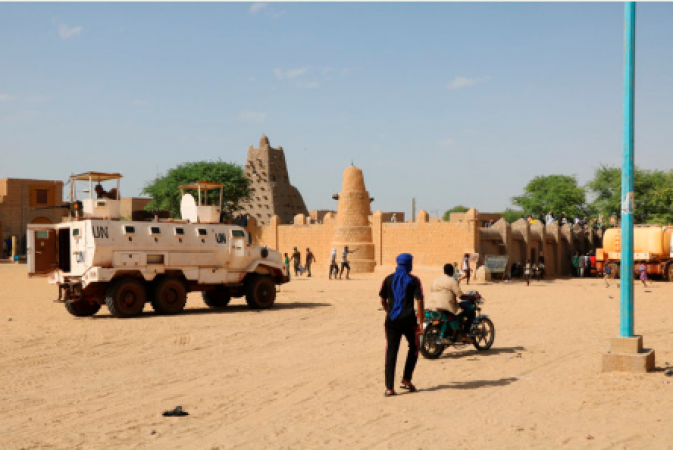
Moscow: In a resounding blow to international efforts, Russia exercised its veto power within the UN Security Council to quash a resolution aimed at extending sanctions on Mali's military junta.
This move, taken on Thursday, came as a setback for the global community's attempts to apply pressure on the junta to relinquish power and restore civilian governance.
The junta had seized control in August 2020 through a coup, toppling the democratically elected government.
Also Read: Amnesty International's Urgent Call for Action on Human Rights Violations in China's Xinjiang
The resolution, jointly drafted by France, the United States, and the United Kingdom, enjoyed the backing of 13 out of the 15 council members.
China, however, chose to abstain. At the crux of the resolution was the extension of existing sanctions, initially imposed on the junta in December 2021, for another year. Additionally, the resolution sought to impose a travel ban and asset freeze on individuals associated with the Wagner Group's activities in Mali.
The Wagner Group, a Russian private military company, has been under scrutiny for alleged human rights abuses not only in Mali but also in other regions.
Also Read: Donald Trump Faces Accusations of Inflating Net Worth Amid Legal Battles
The ramifications of Russia's veto reverberate on multiple fronts. Firstly, the international community's collective endeavor to coax the Malian junta into relinquishing its hold on power faces a significant blow.
By torpedoing the resolution, Russia obstructs the path toward restoring civilian rule and democratic governance in the strife-torn nation.
Russia's overt support for the Malian junta has been conspicuous. This is the third occasion in which Russia has employed its veto power to thwart UN resolutions that sought to impose sanctions on the junta.
This consistent backing underscores Russia's strategic interests in the region and its burgeoning influence in Africa.
The veto's implications are not confined solely to Mali; they underscore Russia's broader ambitions in Africa. In recent years, Russia has substantially expanded its military presence across the continent.
This ascent positions Russia as a formidable contender to the United States and France, both of whom have held considerable influence in the region historically.
The ramifications of the Russian veto reverberate throughout the United Nations as well. The UN Security Council is the preeminent international body entrusted with the maintenance of global peace and security.
However, the formidable veto power wielded by its five permanent members - China, France, Russia, the United Kingdom, and the United States - provides them the ability to halt any measure they find disagreeable. While designed to ensure consensus among major powers, this system at times results in political gridlock.
Russia's veto has implications beyond the immediate junta-related context. It serves to bolster the junta's resolve while concurrently making it arduous for the international community to exert pressure on the restoration of civilian governance.
Moreover, it casts a shadow on the UN's attempts to address the pervasive issue of private military companies in Africa, of which the Wagner Group is a prominent example.
The chilling effect of the veto on addressing private military companies' activities in Africa is noteworthy. These entities often operate in the shadows, and their actions can lead to human rights abuses, undermining regional stability and security. By stifling attempts to scrutinize and regulate their activities, Russia's veto could potentially exacerbate these issues.
The situation raises broader questions about the structure and functioning of the UN Security Council. While the veto system ensures the inclusion of major global powers and their interests, it can also hinder swift and effective action.
In cases where the interests of permanent members clash, the result is often inaction or compromises that may not effectively address the core issues at hand.
As the dust settles from the aftermath of the veto, the international community faces a challenging road ahead. The junta's consolidation of power could be emboldened, and prospects for democratic governance could further dim.
Additionally, the UN's efforts to address the issue of private military companies could be stymied, creating a troubling void in oversight and accountability.
Also Read: G20 New Delhi Summit 2023: Forging a Path to Global Unity and Sustainable Prosperity
The incident serves as a stark reminder of the complexities and challenges of multilateral diplomacy. The UN, designed to facilitate global cooperation, is often stymied by the divergent interests of its member states.
The Mali junta and the Wagner Group are just a microcosm of larger geopolitical dynamics that shape the fate of nations and regions. In this landscape, the Russian veto underscores not just a singular setback but a broader narrative of power, influence, and the intricacies of international decision-making.